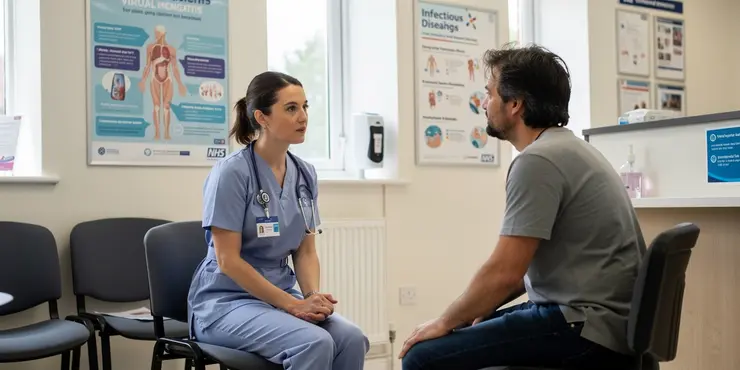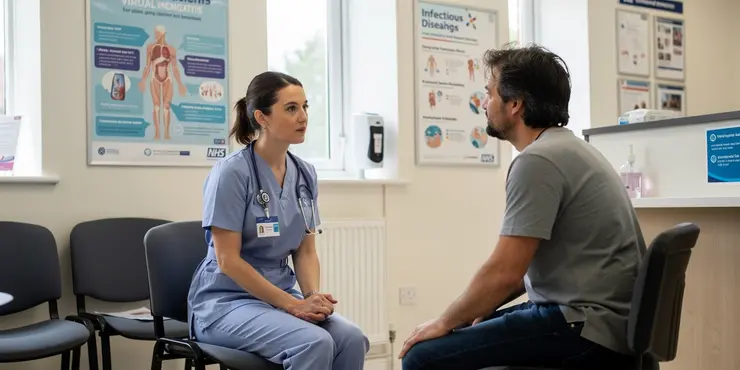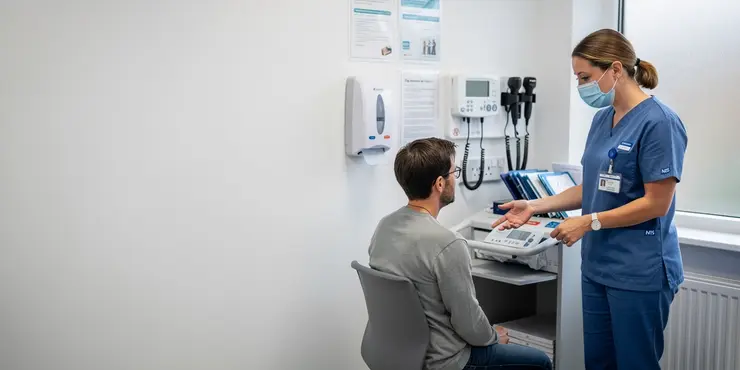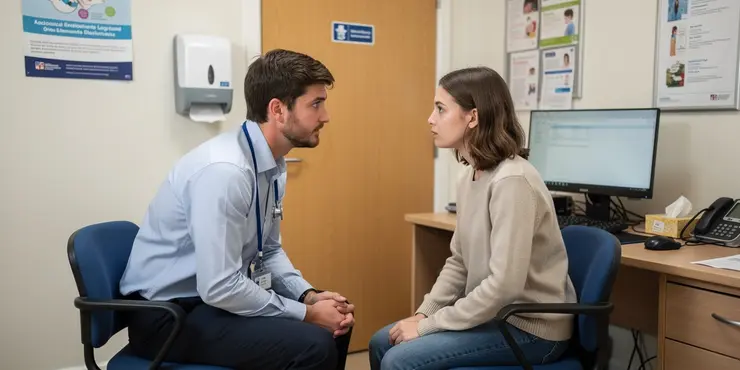
Find Help
More Items From Ergsy search
-

What causes viral meningitis?
Relevance: 100%
-

What is the prognosis for viral meningitis?
Relevance: 86%
-

How is viral meningitis spread?
Relevance: 86%
-

Can meningitis cause long-term complications?
Relevance: 65%
-

What is meningitis?
Relevance: 63%
-

What causes bacterial meningitis?
Relevance: 63%
-
Is meningitis contagious?
Relevance: 62%
-

What are the main types of meningitis?
Relevance: 59%
-

How is meningitis diagnosed?
Relevance: 58%
-

Why is meningitis a medical emergency?
Relevance: 57%
-

What are common symptoms of meningitis?
Relevance: 54%
-

Can meningitis be prevented?
Relevance: 50%
-

What is non-infectious meningitis?
Relevance: 49%
-

How serious is bacterial meningitis?
Relevance: 49%
-

What are the signs of meningitis in infants?
Relevance: 49%
-

Are there vaccines for meningitis?
Relevance: 47%
-

Does the CDC recommend meningitis vaccines for adolescents?
Relevance: 47%
-

Do people who have had meningitis in the past need to be vaccinated?
Relevance: 46%
-

Should health care workers get the meningitis vaccine?
Relevance: 46%
-

What is the treatment for bacterial meningitis?
Relevance: 45%
-

Is vaccination recommended for seniors against meningitis?
Relevance: 45%
-

Are adults over 25 recommended for meningitis vaccination?
Relevance: 44%
-

Is meningitis vaccination required for military recruits?
Relevance: 44%
-

Are there any specific groups that should prioritize meningitis vaccination?
Relevance: 43%
-

Who should get a meningitis vaccination?
Relevance: 43%
-

Who is at higher risk of contracting meningitis?
Relevance: 43%
-

Do antibiotics work on viral infections?
Relevance: 43%
-

Should college students get the meningitis vaccine?
Relevance: 41%
-

How is fungal meningitis treated?
Relevance: 41%
-

Do international students need the meningitis vaccine?
Relevance: 39%
-

What are the guidelines for meningitis vaccination for HIV-infected individuals?
Relevance: 39%
-

What does an undetectable viral load mean?
Relevance: 39%
-
What are the meningitis vaccination recommendations for travelers to Hajj or Umrah?
Relevance: 35%
-

Causes of a sore throat
Relevance: 32%
-

What causes appendicitis?
Relevance: 28%
-

What causes motor neurone disease?
Relevance: 28%
-

What causes chronic fatigue syndrome?
Relevance: 27%
-

What causes heart failure?
Relevance: 24%
-

Can Nipah Virus cause neurological complications?
Relevance: 24%
-

What causes shingles?
Relevance: 24%
Understanding Viral Meningitis
Viral meningitis is an inflammation of the protective membranes covering the brain and spinal cord, known as the meninges. This condition is primarily caused by viral infections and is generally less severe than bacterial meningitis. Understanding the causes of viral meningitis is crucial for prevention, diagnosis, and management. This article explores the various viruses that can lead to viral meningitis, how these infections occur, and who is most at risk.
Common Viral Causes
Viral meningitis is most often caused by non-polio enteroviruses, a group of common viruses that affect millions of people every year, often in the summer and autumn. These include Coxsackieviruses and Echoviruses. Although enteroviruses are the most common cause, a variety of other viruses can also lead to meningitis.
Herpes simplex virus (HSV), which is more famously known for causing cold sores and genital herpes, can occasionally cause viral meningitis. Other herpesviruses, such as varicella-zoster virus (which causes chickenpox and shingles) and Epstein-Barr virus (responsible for infectious mononucleosis), can also result in meningitis.
Mumps virus was a more common cause of viral meningitis before the introduction of widespread vaccination. In addition, viruses like HIV, lymphocytic choriomeningitis virus, and certain arboviruses transmitted by insects, such as the West Nile virus, can also lead to viral meningitis.
Transmission and Risk Factors
Viral meningitis is usually spread through direct contact with an infected person. This can happen through respiratory droplets when someone coughs or sneezes, touching surfaces contaminated with the virus, or by coming into contact with faeces. Sharing personal items such as utensils, lip balm, or drinks can also facilitate the spread of viruses.
Individuals at higher risk for viral meningitis include infants, children, and those with weakened immune systems. Certain settings, such as schools, nurseries, and dormitories, can increase the risk of transmission due to close quarters and shared facilities. Poor hygiene practices, such as inadequate handwashing, can also increase the risk of contracting viral meningitis.
Preventive Measures
Preventing the spread of viruses that cause meningitis involves good hygiene practices. Regular handwashing, especially after using the toilet and before meals, is essential. Avoiding close contact with infected individuals can prevent the spread of viral infections. Vaccines can also protect against some viruses that cause meningitis, such as the mumps vaccine, which is part of the MMR vaccine.
While viral meningitis can be distressing, understanding its causes can help in taking appropriate preventive measures. Anyone experiencing symptoms of meningitis, such as fever, headache, stiff neck, and sensitivity to light, should seek medical attention promptly. Always consult with healthcare professionals for accurate diagnosis and treatment.
Understanding Viral Meningitis
Viral meningitis happens when the covers around your brain and spine get swollen. These covers are called meninges. A virus usually causes this swelling. Viral meningitis is often not as bad as bacterial meningitis. Knowing what causes viral meningitis can help us stop it, find it early, and treat it. This guide talks about the viruses that can cause viral meningitis, how people catch it, and who might get it more easily.
Common Viral Causes
The main viruses that cause viral meningitis are non-polio enteroviruses. These viruses affect lots of people, especially in summer and autumn. They include Coxsackieviruses and Echoviruses. Other viruses can also cause viral meningitis.
The herpes simplex virus can also cause viral meningitis. This virus is known for cold sores and genital herpes. Some other herpesviruses, like the one that causes chickenpox and shingles, and another that causes glandular fever, can lead to meningitis too.
Before vaccines were common, the mumps virus often caused viral meningitis. Viruses like HIV, lymphocytic choriomeningitis virus, and some viruses from insects, like the West Nile virus, can also cause it.
Transmission and Risk Factors
People catch viral meningitis from others who have the virus. This can happen if someone sneezes or coughs on you, or if you touch something with the virus on it. Sharing things like forks, lip balm, or drinks can also spread the virus.
Babies, young children, and people with weak immune systems are more likely to get viral meningitis. Crowded places like schools and dorms can make it easier for viruses to spread. Not washing hands properly also makes it easier to catch viral meningitis.
Preventive Measures
To stop the spread of viruses that cause meningitis, keep clean! Wash your hands often, especially after using the toilet and before eating. Stay away from people who are sick. Vaccines, like the one for mumps, can stop some viruses from causing meningitis.
If you know what causes viral meningitis, you can help stop it. If you feel things like fever, headache, stiff neck, or find light too bright, see a doctor. Doctors can help find out what's wrong and give you the right treatment.
Frequently Asked Questions
What is viral meningitis?
Viral meningitis is an inflammation of the membranes (meninges) surrounding the brain and spinal cord caused by a viral infection.
What are the common viruses that cause viral meningitis?
Enteroviruses are the most common cause of viral meningitis, but other viruses such as herpes simplex, varicella zoster, mumps, measles, and influenza can also cause it.
How do enteroviruses cause viral meningitis?
Enteroviruses can enter the body through the gastrointestinal tract and spread to the central nervous system, causing inflammation of the meninges.
Is herpes simplex virus associated with viral meningitis?
Yes, herpes simplex virus can cause viral meningitis, especially HSV-2, which is more commonly associated with meningitis than HSV-1.
Can mumps virus lead to viral meningitis?
Yes, mumps virus can cause viral meningitis, although it is less common today due to widespread vaccination.
What role does varicella-zoster virus play in viral meningitis?
Varicella-zoster virus, the cause of chickenpox and shingles, can also lead to viral meningitis, particularly in adults.
How do respiratory viruses contribute to viral meningitis?
Respiratory viruses, such as influenza, can lead to viral meningitis by spreading to the central nervous system.
Are there specific risk factors for developing viral meningitis?
Risk factors include age (children under 5 and older adults), weakened immune systems, and exposure to viral infections.
Is viral meningitis contagious?
The viruses that cause viral meningitis can be contagious, but the meningitis itself is not usually spread directly from person to person.
How does viral meningitis differ from bacterial meningitis?
Viral meningitis is generally less severe than bacterial meningitis and usually resolves without specific treatment, whereas bacterial meningitis can be life-threatening.
What symptoms suggest a person may have viral meningitis?
Common symptoms include headache, fever, stiff neck, sensitivity to light, nausea, and vomiting.
How is viral meningitis diagnosed?
Diagnosis often involves a lumbar puncture to test cerebrospinal fluid, blood tests, and sometimes imaging studies.
Can vaccines prevent viral meningitis?
Vaccines can prevent some of the viruses that cause meningitis, such as measles, mumps, and varicella-zoster.
Is treatment available for viral meningitis?
Treatment focuses on relieving symptoms since there is no specific antiviral treatment for most cases. Severe cases may require hospitalization.
How long do symptoms of viral meningitis last?
Most people recover completely within 7 to 10 days, but fatigue and other minor symptoms may last longer.
Is hospitalization required for viral meningitis?
Mild cases may be managed at home, but severe cases may require hospitalization for supportive care.
Can viral meningitis cause long-term complications?
Long-term complications are rare, but some people might experience headaches, fatigue, or memory issues for a period of time.
Can pregnant women get viral meningitis?
Yes, pregnant women can develop viral meningitis, but the overall risk to the mother and fetus is normally low.
Does age affect the risk of viral meningitis?
Yes, children under 5 and adults over 60 are more likely to develop viral meningitis.
What are the preventive measures to reduce the risk of viral meningitis?
Preventive measures include good hygiene practices, vaccination, avoiding close contact with infected individuals, and ensuring clean water sources.
What is viral meningitis?
Viral meningitis is a sickness. It makes the brain and spine swell. This can make you feel sick. It is not as dangerous as other types of meningitis. Most people get better on their own.
If you feel sick, tell an adult or a doctor. You can rest and drink lots of water to feel better. Listening to calming music or reading a fun book can help too.
Viral meningitis happens when there is swelling around the brain and spinal cord. This swelling is caused by a virus.
What viruses cause viral meningitis?
Some bugs can make you sick. These bugs are called viruses. They can cause a problem in the brain called viral meningitis.
Here are some common viruses that can do this:
- Coxsackie virus
- Echo virus
- Herpes virus
- West Nile virus
Ask a grown-up to help you learn more. You can also use pictures and videos to understand better.
Usually, a virus called enterovirus causes viral meningitis. But other viruses can do it too, like herpes simplex, chickenpox, mumps, measles, and the flu.
How do enteroviruses cause viral meningitis?
Enteroviruses are tiny germs that can make people sick. They can go inside the body and cause a disease called viral meningitis.
Viral meningitis happens when the germs make the brain and spine swell and hurt. This can make a person feel very sick.
Remember, if you or someone else is sick, go to a doctor. Doctors can help figure out what is wrong and how to get better.
It can help to use pictures or videos to learn more about how germs work. Parents and teachers can explain things if you have questions.
Enteroviruses can get into the body through the tummy and then move to the brain. They can make the layer that covers the brain, called the meninges, swell up.
Can the herpes virus cause a brain infection?
Yes, a germ called herpes can make people sick with something called viral meningitis. There are two types of this germ. Herpes type 2 can cause meningitis more often than herpes type 1.
Can mumps virus cause viral meningitis?
Mumps is a virus that makes you sick. It can make your cheeks swell and hurt.
Meningitis is when the lining around your brain and spine gets swollen.
Sometimes, mumps can cause meningitis. This means you can get very sick.
If you're worried, it's good to talk to a doctor.
Using pictures or videos can help you understand more about mumps and meningitis.
Yes, the mumps virus can make people sick with something called viral meningitis. This does not happen very often now because most people get a vaccine that stops them from getting mumps.
What is the role of varicella-zoster virus in viral meningitis?
Varicella-zoster virus (VZV) is a germ. It can cause chickenpox and shingles.
Sometimes, VZV can also cause a sickness called viral meningitis.
In viral meningitis, the covering of the brain and spine gets swollen.
VZV can make people feel very sick with headaches, fever, and stiff neck.
To learn more, you can talk to a doctor or use helpful tools like picture books or videos.
The varicella-zoster virus can make you sick. It causes chickenpox and shingles. Sometimes, it can also make adults get a sickness called viral meningitis.
What do breathing viruses have to do with brain illness?
Viruses can make you sick. Some viruses make it hard to breathe. These are called breathing viruses. Sometimes, these breathing viruses can also make your brain sick. This brain sickness is called viral meningitis.
Here's how it happens:
- The virus gets inside your body through your nose or mouth.
- It can travel to your brain and make the covering of your brain swell up.
- This swelling is called meningitis, and it can make you feel very sick.
If you have a hard time reading, you can ask an adult for help. You can also use tools like audiobooks or apps that read text out loud.
Viruses that cause colds and flu can sometimes make their way to the brain and cause an illness called viral meningitis.
What makes someone more likely to get viral meningitis?
Some things can make people more likely to get sick. These are:
- Being a child under 5 years old
- Being an older adult
- Having a weak immune system
- Being around people with viruses
If reading is hard, try using tools like audiobooks or reading apps to help!
Can you catch viral meningitis from someone?
Yes, you can catch viral meningitis from someone else. It's a sickness caused by germs, like a virus. It's a bit like catching a cold.
To stay safe, remember to:
- Wash your hands often, especially after using the bathroom and before eating.
- Cover your mouth with a tissue or your arm when you cough or sneeze.
- Try to avoid close contact with anyone who is sick.
If you need help, ask someone you trust to explain or use pictures to understand better.
Some germs can make people sick with viral meningitis. These germs can spread from one person to another. But the sickness called meningitis usually does not spread directly from person to person.
What is the difference between viral meningitis and bacterial meningitis?
Viral meningitis is not as serious as bacterial meningitis. It usually gets better by itself. But bacterial meningitis can be very dangerous.
What signs show someone might have viral meningitis?
Viral meningitis is when a virus makes the brain's covering swell up. Here are some signs that someone might have it:
- High fever
- Headache
- Stiff neck
- Feeling very tired
- Feeling sick with a stomachache
- Hard to look at bright lights
If you think someone has these signs, tell a grown-up or doctor soon. They can help find out what's wrong.
Signs you might be sick:
- Your head hurts.
- You have a fever.
- Your neck feels stiff.
- You don’t like bright lights.
- You feel sick in your tummy.
- You might throw up.
If you feel like this, tell someone and get help. You can try lying down in a dark, quiet room. Drinking water can also help. If you have a fever, you might want to use a cool cloth on your forehead.
How do doctors find out if someone has viral meningitis?
Doctors use some tests to find out what is wrong. They might use a needle in the lower back to test the fluid in the spine. This is called a lumbar puncture. They also check your blood with blood tests. Sometimes, they take pictures of the inside of your body with special machines. This is called imaging.
Do vaccines stop viral meningitis?
Vaccines might not stop viral meningitis all the time, but they help. Some vaccines can protect you from viruses that might cause meningitis.
Ask a doctor or a nurse for advice. They can tell you about vaccines that can help.
Using pictures or a video can make it easier to understand.
Some vaccines can stop certain viruses that cause meningitis. These viruses include measles, mumps, and chickenpox.
Can doctors help if you have viral meningitis?
The doctors give medicine to help you feel better. They cannot give medicine that fights the virus. If you are very sick, you might need to go to the hospital.
How long does viral meningitis make you feel sick?
Viral meningitis can make you feel unwell.
Most people start to feel better in 7 to 10 days.
It is important to rest and drink lots of fluids.
Ask a grown-up to talk to a doctor if you feel very bad.
Using a calendar to mark each day you feel better can help you track your progress.
Most people get better in 7 to 10 days. But some people might feel tired or have small problems for a longer time.
Do you need to go to the hospital for viral meningitis?
If someone is a little bit sick, they can usually get better at home. But if they are very sick, they might need to go to the hospital to get extra help and care.
Can viral meningitis cause problems for a long time?
Viral meningitis is a sickness that affects the brain and spine.
Most people get better without problems.
But some people might have problems that last a long time.
These problems can include headaches, trouble concentrating, or feeling tired.
If you have questions, talk to a doctor or nurse.
Using simple tools like pictures or videos can help understand better.
Problems that last a long time do not happen often. Some people might get headaches, feel very tired, or have trouble remembering things for a while.
Can pregnant women catch viral meningitis?
Yes, pregnant women can get viral meningitis. But don't worry too much, because it usually doesn't hurt the mother or the baby.
Does age change the chance of getting viral meningitis?
Age can change how likely someone is to get viral meningitis.
Helpful tools:
- Pictures can help explain ideas.
- Using a calendar can show different ages.
- Talking with an adult can help answer questions.
Yes, young kids under 5 and adults over 60 can get viral meningitis more easily.
How can we stop viral meningitis from spreading?
Here are some easy ways to stay healthy:
- Wash your hands often with soap and water.
- Avoid close contact with people who are sick.
- Cover your mouth and nose when you sneeze or cough.
- Clean surfaces like tables and doorknobs regularly.
- Stay up-to-date with your vaccinations.
Ask a grown-up or a doctor if you need help with any of these tips.
Here are some ways to stay healthy:
1. Wash your hands to keep them clean.
2. Get your vaccines to stop getting sick.
3. Stay away from people who are sick.
4. Make sure the water you drink is clean.
You can use pictures, or ask someone to help, to remember these tips. You could put reminder notes around your home.
Useful Links
This website offers general information and is not a substitute for professional advice.
Always seek guidance from qualified professionals.
If you have any medical concerns or need urgent help, contact a healthcare professional or emergency services immediately.
Some of this content was generated with AI assistance. We’ve done our best to keep it accurate, helpful, and human-friendly.
- Ergsy carfully checks the information in the videos we provide here.
- Videos shown by Youtube after a video has completed, have NOT been reviewed by ERGSY.
- To view, click the arrow in centre of video.
- Most of the videos you find here will have subtitles and/or closed captions available.
- You may need to turn these on, and choose your preferred language.
- Go to the video you'd like to watch.
- If closed captions (CC) are available, settings will be visible on the bottom right of the video player.
- To turn on Captions, click settings .
- To turn off Captions, click settings again.
More Items From Ergsy search
-

What causes viral meningitis?
Relevance: 100%
-

What is the prognosis for viral meningitis?
Relevance: 86%
-

How is viral meningitis spread?
Relevance: 86%
-

Can meningitis cause long-term complications?
Relevance: 65%
-

What is meningitis?
Relevance: 63%
-

What causes bacterial meningitis?
Relevance: 63%
-
Is meningitis contagious?
Relevance: 62%
-

What are the main types of meningitis?
Relevance: 59%
-

How is meningitis diagnosed?
Relevance: 58%
-

Why is meningitis a medical emergency?
Relevance: 57%
-

What are common symptoms of meningitis?
Relevance: 54%
-

Can meningitis be prevented?
Relevance: 50%
-

What is non-infectious meningitis?
Relevance: 49%
-

How serious is bacterial meningitis?
Relevance: 49%
-

What are the signs of meningitis in infants?
Relevance: 49%
-

Are there vaccines for meningitis?
Relevance: 47%
-

Does the CDC recommend meningitis vaccines for adolescents?
Relevance: 47%
-

Do people who have had meningitis in the past need to be vaccinated?
Relevance: 46%
-

Should health care workers get the meningitis vaccine?
Relevance: 46%
-

What is the treatment for bacterial meningitis?
Relevance: 45%
-

Is vaccination recommended for seniors against meningitis?
Relevance: 45%
-

Are adults over 25 recommended for meningitis vaccination?
Relevance: 44%
-

Is meningitis vaccination required for military recruits?
Relevance: 44%
-

Are there any specific groups that should prioritize meningitis vaccination?
Relevance: 43%
-

Who should get a meningitis vaccination?
Relevance: 43%
-

Who is at higher risk of contracting meningitis?
Relevance: 43%
-

Do antibiotics work on viral infections?
Relevance: 43%
-

Should college students get the meningitis vaccine?
Relevance: 41%
-

How is fungal meningitis treated?
Relevance: 41%
-

Do international students need the meningitis vaccine?
Relevance: 39%
-

What are the guidelines for meningitis vaccination for HIV-infected individuals?
Relevance: 39%
-

What does an undetectable viral load mean?
Relevance: 39%
-
What are the meningitis vaccination recommendations for travelers to Hajj or Umrah?
Relevance: 35%
-

Causes of a sore throat
Relevance: 32%
-

What causes appendicitis?
Relevance: 28%
-

What causes motor neurone disease?
Relevance: 28%
-

What causes chronic fatigue syndrome?
Relevance: 27%
-

What causes heart failure?
Relevance: 24%
-

Can Nipah Virus cause neurological complications?
Relevance: 24%
-

What causes shingles?
Relevance: 24%


